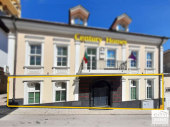|
News
| Bulgarian National Bank to be able to print euro notes |
|
Thursday, May 18, 2017 |
|
The Oberthur Fiduciaire joint venture company of the Bulgarian National Bank and French company Oberthur Fiduciaire SAS, has received from the European Central Bank permission to print euro banknotes. This does not mean that the machines of the ultra-modern printing house of the Bulgarian National Bank will start printing euros tomorrow but this means that this printing house will be able to compete for orders from the European Central Bank.
This news can be interpreted in different ways. From a technological perspective, it is recognition that Bulgaria has a printing house that meets the ECB's highest quality requirements for banknotes and the bank can be proud of this. From a security point of view, the news is also good. The certificate shows that even the most stringent security requirements for printing money can be observed in Bulgaria. But there rises the question: If we could we print euros, could we also accept it as national currency?
The answer is not an easy one. Euro banknotes will be printed in Bulgaria but the single currency remains as distant as before. However the intention of both sides - Bulgaria and the eurozone countries, to do something concrete and make steps towards Bulgaria's accession to the Eurozone, has not changed. On the other hand Bulgaria has already done a lot of things in this regard, one of which, and maybe one of the most important, was the introduction of a fixed exchange rate twenty years ago at first against the German mark and then the euro. This actually means that two levs always equals one euro and that’s it. In payments, the euro is not accepted everywhere - for larger purchases like a home or a car, the euro is welcomed, but one cannot buy cheese or milk from the store using euro.
From a purely formal point of view, the introduction of the euro in Bulgaria should not be a problem. Bulgaria meets almost all Maastricht criteria for joining the euro area. There are still some banking and financial details, but that's why the ERM2 exists, or the so-called waiting room for joining the Eurozone. Past practice has shown that approximately two years in this waiting room are needed. They are sufficient to fully synchronize the Bulgarian banking and financial system with that of the euro zone.
But reality is different. First of all, it should be pointed out that the Eurozone has been becoming increasingly closed and inhospitable. Discussions have taken place over its institutionalization or turning it into a core or in a mini-EU. Even if it is not about forming some kind of EU 2, it is obvious that new members to the Eurozone will not be allowed soon. Especially Bulgaria, which is blamed from left and right on every possible occasion that it was a state lacking justice, in which corruption and organized crime reign. Evidence of EU's stubborn attitude towards Bulgaria is also not allowing the country to join the Schengen area, despite the fact that it has fulfilled all the written criteria for entry into the area of free movement.
All this suggests that geographically, politically and economically Bulgaria remains a peripheral country for the EU and that nobody is particularly interested in its internal problems. For this reason, it is unrealistic to say that once the Bulgarian Central Bank starts printing euro banknotes, this would bring the country closer to Schengen or the Eurozone. |
|
|
Source:
bnr.bg
|
|
|
|
|
| » RENTALS |

|
|
|
| Shop / Retail |
€ 1 500 |
|
| Location: |
Veliko Tarnovo |
|
|

|